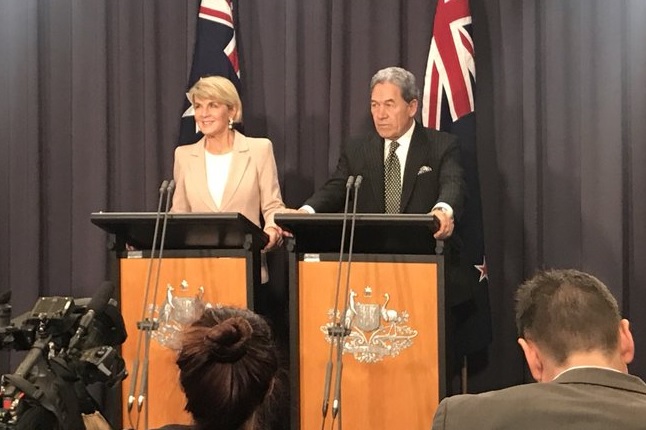
If Australia weren’t so important to New Zealand, New Zealanders could relish the farce masquerading as politics in Canberra.
Australians used to denigrate New Zealand’s post-1993 proportional voting system. But Helen Clark got nine years in office, John (now Sir John) Key had eight years before handing over to Bill (now Sir William) English for a ninth year, and Jacinda Ardern is solidly supported in her party and by her two coalition partners, with a credible prospect of six years or more.
Now, some joke, to understand Canberra’s whirling turnstile of prime ministers, we must remember that Australia grows bananas—abundantly.
In the early 1980s, Australian deputy prime minister Doug Anthony worried that New Zealand’s dicky economy might make it an unstable neighbour—hence, he told me, the need for the closer economic relationship free trade agreement (CER).
Turn that around. Is Australia now stable enough to be a reliable partner in the region and build CER into a genuine single economic market?
Ardern talked on Friday of ‘close ties in all areas of our relationship, including on trade, economic, defence and security matters’. ‘[W]e cooperate closely in our region and on the international stage.’
She said she was ‘looking forward to working with [Prime Minister Scott] Morrison to advance that’.
Foreign Minister Winston Peters noted that Morrison was involved in New Zealand tourism administration when the ‘high-profile’ ‘100% Pure New Zealand’ campaign slogan was coined.
Morrison headed the NZ Office of Tourism and Sport from 1998 to 2000. The Audit Office criticised a report of his to Tourism Minister Murray McCully on the separate Tourism Board. McCully resigned after the Audit Office criticised his dealings with the board.
Peters depicted Morrison as ‘familiar with the New Zealand political psyche, the composition of New Zealand, how [we] think and work’.
He didn’t mention Morrison’s hard line as immigration minister foreshadowing Home Affairs Minister Peter Dutton’s detention and deportation of convicted prisoners born in New Zealand, some of whom had lived in Australia since they were children and were criminalised there.
Add the inhumane treatment of refugees on Manus Island and Nauru and refusal to take up New Zealand’s offer to resettle some of them.
The Morrison–Dutton party could be called the Illiberals. In July, Justice Minister Andrew Little called Dutton’s policy ‘venal’ and didn’t retract the comment when Dutton hit back. Earlier that month, Peters—as acting prime minister while Ardern was on maternity leave—said Australia had breached the United Nations Convention on the Rights of the Child in detaining a 17-year-old New Zealander.
Still, Ardern on Friday gave Malcolm Turnbull credit for the ‘Pathway to Citizenship, which has allowed many New Zealanders to regularise their status in Australia’—around 600,000 people born in New Zealand live in Australia—and thus claim some services they have paid taxes towards but are denied while not citizens.
And the turmoil does not—at least not yet—undermine cooperation in security and development in the South Pacific. New Zealand has begun a ‘reset’ of its engagement with the island nations, recognising its growing Pacific ethnic minority, the important marine food and other resources in the sparsely populated region, and China’s growing presence, including with large loans.
New Zealand also values the positive aspects of Australia’s engagement in East Asia, including the expected announcement of a free trade deal with Indonesia.
But there are differences. One is between New Zealand’s ‘independent foreign policy’ and Australia’s tight US military alliance and more assertive stance on China’s activities in East and Southeast Asia and influence in Australia’s universities and its politics.
Another difference is on climate change. Morrison is a coal champion. Ardern backs the Paris accord.
And New Zealand businesses find progress frustratingly slow on removing obstacles to the single economic market. Australia is the biggest foreign market for manufactures and a stepping stone to bigger markets.
Insiders say Australia moves on a matter needing joint action such as CER only when it’s high on Canberra’s domestic action list.
And why not? Australia is the bigger sibling in this unequal ‘close relationship’. Bigger siblings are often dismissive—sometimes with justification, as over New Zealand’s paltry defence contribution (now being edged upward).
This dismissal is usually veiled behind platitudes. But sometimes the veil slips. Julie Bishop declared during New Zealand’s 2017 election campaign that she couldn’t work with a Labour government. Interference in another country’s election offends diplomatic propriety—Bishop was foreign minister. Turnbull didn’t correct her.
That’s life. More worrying to Wellington is instability in Canberra, because stable politics there are critical to a stable relationship, and even a switch to Labor wouldn’t assure that, given its travails and Bill Shorten’s unfamiliarity with the Tasman sibling.
For now, to New Zealanders Canberra truth looks stranger than fiction—as Politik editor Richard Harman unintentionally encapsulated in a typo calling the deeply factionalised Liberals ‘fictionalised’.

